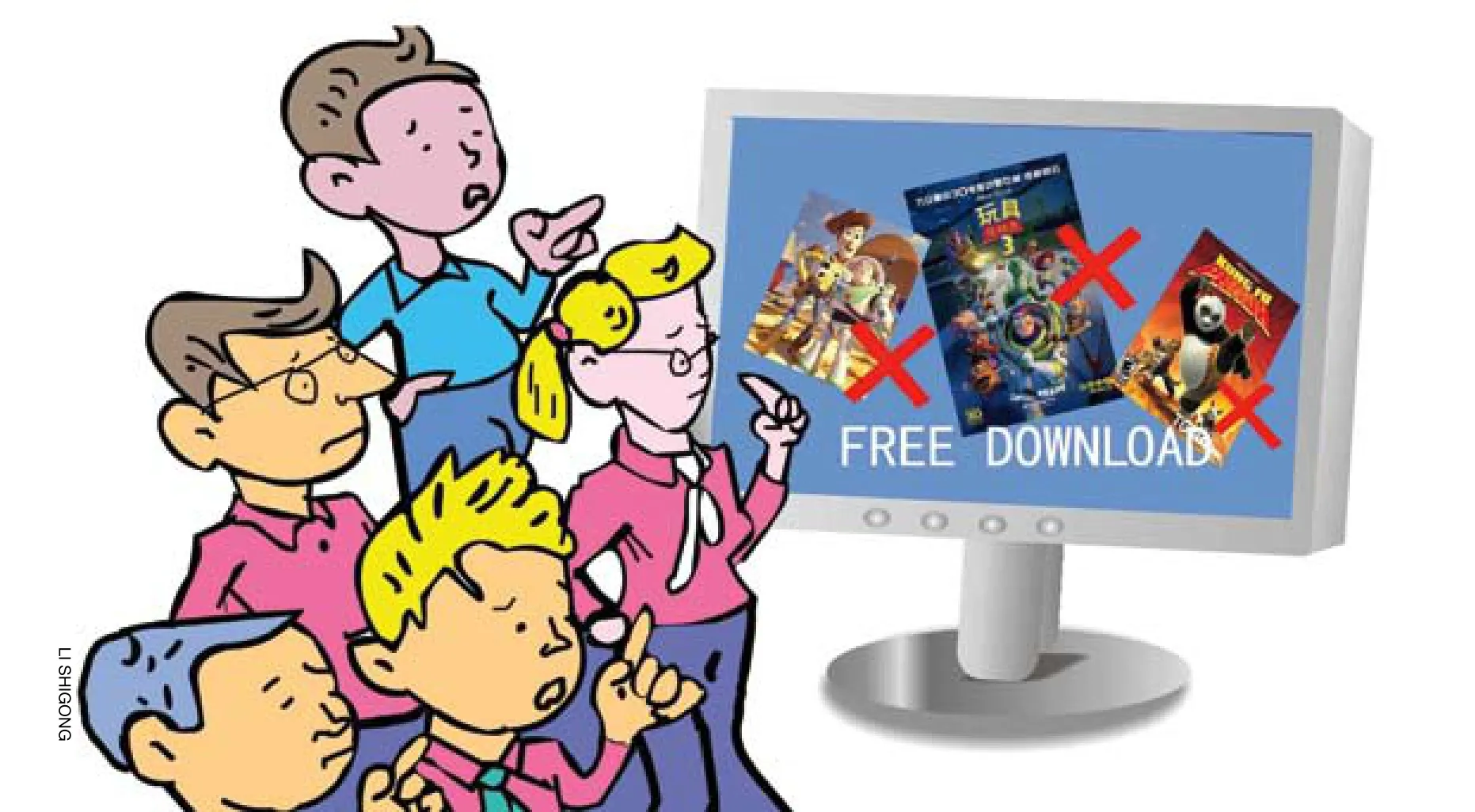Free Doesn’t Come Easy
2011-03-15JINGXIAOLEI
The self-initiated transformation of China’s biggest P2P file-sharing website signals the country’s tougher solution for copyright piracy

By JING XIAOLEI
In late January, many Chinese netizens were surprised to find that free digital music download links were no longer available on popular fi le-sharing website VeryCD.com.
Though some movies for online watching were still available, the website will probably face a suspension since it has not acquired authorization from the State Administration of Radio, Film and Television (SARFT), according to China News Service.
The website, offering mostly unauthorized music and movie downloads for free, has removed all of its music download links and posted a note saying the move was done “to meet copyright owner requests.”
The website’s founder, Huang Yimeng,said on his micro blog he “has known this day would come,” raising concerns the website faces a likely permanent shutdown. Later Huang explained to the Shanghai-based Youth Daily the move was a temporary selfadjustment rather than a shutdown.
The site aimed to provide licensed content without piracy over the past few years,said Huang, adding it was the quick decision to delete the links that might had misled website visitors.
The shutdown of the music download service had stirred some sentiment among VeryCD.com’s users. They mourned over the possible loss of their favorite free contents sharing site by circulating a Photoshop-edited picture with the logo of the site, a donkey,framed in black.
The chronic shutdown
Opened in 2003, VeryCD.com was carrying on eMule technology, which is a fi lesharing program also known as a “Peer to Peer” client created by Hendrik Breitkreuz, a German also known as Merkur. In May 2002,together with some other developers, Merkur created eMule because of their dissatisfaction with the “eDonkey2000” client, which was originally developed by MetaMachine Inc.,a New York-based producer of some of the most popular fi le-sharing applications.
The eMule-tech-based VeryCD.com does not carry files, but offers links, which spawn into the program. During the past few years, the site grew to include links for music, movies, software, books, magazines and educational materials. The website remains very in fl uential among Chinese netizens and attracts at least 3 million hits every day.
However, the site has never been licensed to distribute videos and music online and the unauthorized contents on the website have got it into persistent troubles.
In 2008, the SARFT issued a warning to the website because it provided downloads of pirated movies. Last July, the China Film Copyright Association sued Verycd.com over its distribution of the kungfu fi lm Ip Man 2 and demanded compensation of nearly 12 million yuan ($1.8 million).
An Xiaofen, producer of the film, said the download sources of the fi lm were found as early as May 4, 2010 on the website, just a week after its release, which attracts tens of thousands of downloads an hour.
In December 2010, the website suspended itself during a nationwide crackdown on online piracy, but it resumed operations a few days later.
The tough regulator SARFT first issued a regulation requiring online audio and video content providers be licensed in December 2007. Such similar notices were also issued in 2009 and 2010 to curb online piracy.
At the end of 2009, BTChina, one of China’s largest BT download sites, was closed as part of the government’s campaign to shut down illegal downloads. But VeryCD.com somehow survived this campaign, despite more than 400 similar websites ceasing to operate.
VeryCD.com has listed a disclaimer to avoid legal troubles saying it will delete pirated works once copyright owners reach them, otherwise they won’t accept any legal responsibility.
Wang Qian, a professor at the Intellectual Property School of the East China University of Political Science and Law, said the website’s countermeasures were effective in line with current legislation.
“But it’s only temporary,” he said.“As long as it’s convicted of copyright infringement, the website will be penalized.VeryCD.com has lost similar cases in court.There’s no such a thing as a free lunch as we all know.”
Finding a way out

TRANSFORMATION TAKES PLACE:China’s biggest P2P file-sharing website VeryCD.com shuts down its music downloading service for copyright concern
Huang said he had been planning a transformation of VeryCD.com a year ago. With the government’s new policies to intensify copyright protection in Internet world, it became hard for the site to survive without ending up in court.
“The regulations are getting stricter and we’re not able to legally provide a similar amount of content as before. That’s why we have to change our content offering,” said Huang.
But Huang also denied rumors VeryCD.com would be turned into a social networking site. He said Internet users’ habits have been shifted from downloading to streaming media, so the site’s movie, music and TV channels now link users to other legal video sharing sites such as PPlive.com.
“I’ve been using VeryCD.com’s downloading service since 2003. I think the site has given users like me a lot during the past seven years. However, I understand the importance of copyright protection. The site is wise to change itself,” said Vincent Wen, a network engineer in Beijing.
Hong Bo, an Internet and Web technology analyst in Beijing, said it is hard for a pure P2P fi le-sharing website to fi nd a practical business model.
However, as most overseas copyrighted entertainment content is still unavailable through legal channels, such sites rise up to meet Chinese netizens’ demands, Hong said.He suggests the government relax import restrictions on foreign entertainment products.
According to Huang, it’s inevitable that in the future licensed content will prevail on the Internet and VeryCD.com is likely to be shifted to a content navigating website.
The possible transformation of VeryCD.com has left its many fans a bit disappointed. It may be good news for audio and video sharing websites such as Youku.com and Tudou.com that have been trying to work with foreign entertainment giants like Disney and Time Warner to obtain legal content.
“Internet users are changing their habits as well, from downloading to watching online,” said Huang.
Getting used to paying
A recent survey shows the number of online video watchers reached 284 million in China by December 2010, but only 6 percent of them had paid for the service. Among nonpaid users, 72 percent said they were used to watching online videos for free and they were not willing to pay in the future.
In the meantime, many paid-service users have complained about the charge standard and the quality of the content and service provided.
Though it’s the trend to pay for the content on the Internet, a growing number of industry insiders believe it’s not the only way for Internet companies to survive, citing the fact free providers are dominating the Internet in news, e-mail, instant messaging and security services.
“We had considered charging the users for downloading and making ourselves agents between the copyright holders and the users. But it will surely meet with little acceptance among users,” said Zhang Gan,Chief Product Of fi cer of VeryCD.com. “How to charge Internet users who are long used to enjoying online sources for free is still a challenge.” ■
A recent survey shows the number of online video watchers reached 284 million in China by December 2010, but only 6 percent of them had paid for the service
